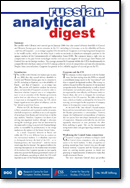Fostering FSC Forest Certification in Russia

Tysiachniouk, Maria
Editor(s): Stephen Aris, Aglaya Snetkov, Matthias Neumann, Robert Orttung, Jeronim Perovic, Heiko Pleines, Hans-Henning Schröder
Series: Russian Analytical Digest (RAD)
Issue: 114
Pages: 8-11
Publisher(s): Center for Security Studies (CSS), ETH Zurich; Research Centre for East European Studies, University of Bremen; Institute of History, University of Basel
Publication Year: 2012
